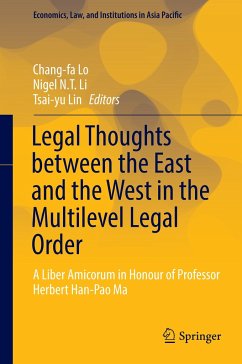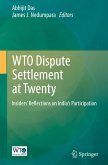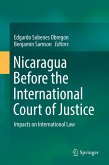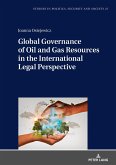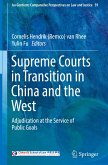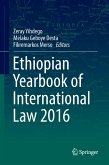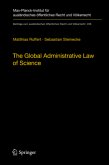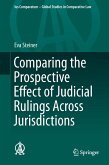Legal Thoughts between the East and the West in the Multilevel Legal Order
A Liber Amicorum in Honour of Professor Herbert Han-Pao Ma
Herausgegeben:Lo, Chang-fa; Li, Nigel N.T.; Lin, Tsai-yu
Legal Thoughts between the East and the West in the Multilevel Legal Order
A Liber Amicorum in Honour of Professor Herbert Han-Pao Ma
Herausgegeben:Lo, Chang-fa; Li, Nigel N.T.; Lin, Tsai-yu
- Gebundenes Buch
- Merkliste
- Auf die Merkliste
- Bewerten Bewerten
- Teilen
- Produkt teilen
- Produkterinnerung
- Produkterinnerung
This book focuses on the interaction and mutual influences between the East and the West in terms of their legal systems and practices. In this regard, it highlights Professor Herbert H.P. Ma's achievements and his efforts to bring Eastern and Western legal concepts and systems closer together. The book shows that, while there have been convergences between different legal regimes in many fields of law, diverse legal practices and approaches rooted in differing cultural, social, political and philosophical backgrounds do remain, and that these differences are not necessarily negative elements…mehr
Andere Kunden interessierten sich auch für
![WTO Dispute Settlement at Twenty WTO Dispute Settlement at Twenty]() WTO Dispute Settlement at Twenty75,99 €
WTO Dispute Settlement at Twenty75,99 €![Nicaragua Before the International Court of Justice Nicaragua Before the International Court of Justice]() Nicaragua Before the International Court of Justice119,99 €
Nicaragua Before the International Court of Justice119,99 €![Global Governance of Oil and Gas Resources in the International Legal Perspective Global Governance of Oil and Gas Resources in the International Legal Perspective]() Joanna OsiejewiczGlobal Governance of Oil and Gas Resources in the International Legal Perspective72,55 €
Joanna OsiejewiczGlobal Governance of Oil and Gas Resources in the International Legal Perspective72,55 €![Supreme Courts in Transition in China and the West Supreme Courts in Transition in China and the West]() Supreme Courts in Transition in China and the West104,99 €
Supreme Courts in Transition in China and the West104,99 €![Ethiopian Yearbook of International Law 2016 Ethiopian Yearbook of International Law 2016]() Ethiopian Yearbook of International Law 201675,99 €
Ethiopian Yearbook of International Law 201675,99 €![The Global Administrative Law of Science The Global Administrative Law of Science]() Matthias RuffertThe Global Administrative Law of Science38,99 €
Matthias RuffertThe Global Administrative Law of Science38,99 €![Comparing the Prospective Effect of Judicial Rulings Across Jurisdictions Comparing the Prospective Effect of Judicial Rulings Across Jurisdictions]() Eva SteinerComparing the Prospective Effect of Judicial Rulings Across Jurisdictions112,99 €
Eva SteinerComparing the Prospective Effect of Judicial Rulings Across Jurisdictions112,99 €-
-
-
This book focuses on the interaction and mutual influences between the East and the West in terms of their legal systems and practices. In this regard, it highlights Professor Herbert H.P. Ma's achievements and his efforts to bring Eastern and Western legal concepts and systems closer together.
The book shows that, while there have been convergences between different legal regimes in many fields of law, diverse legal practices and approaches rooted in differing cultural, social, political and philosophical backgrounds do remain, and that these differences are not necessarily negative elements in the contemporary legal order. By examining different levels of the legal order, including domestic, regional and multilateral, it goes on to argue that identifying these diversities and addressing the interactions and mutual influences between different regimes is a worthwhile undertaking, not only in terms of mutual enrichment, but also with regard to intensifyingthe degree of desirable coordination between different legal systems.
All chapters were written by leading experts, practitioners and scholars from different jurisdictions with expertise in various fields of law and different levels of the legal order, and discuss a number of issues with particular focus on either "one-way" or mutual influences between the Eastern and the Western legal systems, practices and philosophies.
The book shows that, while there have been convergences between different legal regimes in many fields of law, diverse legal practices and approaches rooted in differing cultural, social, political and philosophical backgrounds do remain, and that these differences are not necessarily negative elements in the contemporary legal order. By examining different levels of the legal order, including domestic, regional and multilateral, it goes on to argue that identifying these diversities and addressing the interactions and mutual influences between different regimes is a worthwhile undertaking, not only in terms of mutual enrichment, but also with regard to intensifyingthe degree of desirable coordination between different legal systems.
All chapters were written by leading experts, practitioners and scholars from different jurisdictions with expertise in various fields of law and different levels of the legal order, and discuss a number of issues with particular focus on either "one-way" or mutual influences between the Eastern and the Western legal systems, practices and philosophies.
Produktdetails
- Produktdetails
- Economics, Law, and Institutions in Asia Pacific
- Verlag: Springer / Springer Nature Singapore / Springer, Berlin
- Artikelnr. des Verlages: 978-981-10-1994-4
- 1st ed. 2016
- Seitenzahl: 636
- Erscheinungstermin: 21. November 2016
- Englisch
- Abmessung: 241mm x 160mm x 40mm
- Gewicht: 1115g
- ISBN-13: 9789811019944
- ISBN-10: 9811019940
- Artikelnr.: 45197875
- Herstellerkennzeichnung Die Herstellerinformationen sind derzeit nicht verfügbar.
- Economics, Law, and Institutions in Asia Pacific
- Verlag: Springer / Springer Nature Singapore / Springer, Berlin
- Artikelnr. des Verlages: 978-981-10-1994-4
- 1st ed. 2016
- Seitenzahl: 636
- Erscheinungstermin: 21. November 2016
- Englisch
- Abmessung: 241mm x 160mm x 40mm
- Gewicht: 1115g
- ISBN-13: 9789811019944
- ISBN-10: 9811019940
- Artikelnr.: 45197875
- Herstellerkennzeichnung Die Herstellerinformationen sind derzeit nicht verfügbar.
Chang-fa Lo is Justice of the Constitutional Court, Taiwan, R.O.C. He is also chairman of the Asia WTO Research Network (AWRN). He was Chair Professor and Lifetime Distinguished Professor at NTU; Dean of NTU Law; Director of Asian Center for WTO and International Health Law and Policy of NTU Law (ACWH). His fields include trade law, public health, competition law and arbitration. He received SJD degree from Harvard. He was appointed by panelist for two WTO cases. He is author/editor of 16 books and about 100 journal papers. Nigel Li is a practicing attorney specializing in dispute resolution and arbitration, media law, human and civil rights, international litigation and constitutional law. He also teaches constitutional law, human rights, ADR and international arbitration. He was Chairman of the Chinese Arbitration Association and President of the Taipei Bar Association. He sits on the Board of the Judicial Reform Foundation. He has involved in numerous Constitutional Court's cases. He received LL.M. degrees from Harvard and NTU. Tsai-yu Lin is professor at NTU College of Law and the Director of ACWH. Professor Lin has actively published books and articles in the areas of WTO laws, international investment Law and international health law. She is also the executive secretary of AWRN and commissioner of Taiwan's International Trade Commission. She is senior member of Editorial Committees of two English journals published by the ACWH. Professor Lin currently advises Taiwan Government on trade and public health issues.
Part I: Introduction.- Chapter 1: Introduction to the Book - Interaction and Mutual Enrichment between the East and the West.- Chapter 2: Introduction of Professor Ma - Herbert Ma and the Arc of Taiwan's Progress.- Part II: Mutual Influence and Interaction in Legal Regimes and Practices.- Chapter 3: The Triumph (?) of Western Law: A Contemporary Perspective.- Chapter 4: How Can We Know What We "Know" about Law and Development? - The importance of Taiwan in Comparative Perspective.- Chapter 5: Judicial Strategies and the Political Question Doctrine - An Investigation into the Judicial Adjudications of the East Asian Courts.- Chapter 6: The Ideas of "Rights" in the "East," "West," and Their Continued Evolution - A Case Study on Taxpayer's Rights in Taiwan.- Part III: Mutual Influence and Interaction in Constitutional Law and Fundamental Rights.- Chapter 7: Comparative Discourse in Constitution Making: An Analysis on Constitutional Framers as Dialectic Agent.- Chapter 8: Constitutional Change in Hong Kong and Taiwan in the Late Twentieth Century - A Comparative Perspective.- Chapter 9: Different Patterns of Applying Transitional Constitutionalism between the Nationalists and the Communists.- Chapter 10: The Presumption of Innocence Principle in the People's Republic of China and in the West.- Chapter 11: Privacy - A Genealogy in the East and the West.- Chapter 12: Compulsory Motherhood Challenged and Remade in the Name of Choice - Framing the Right to Choose under Old and New Maternalism.- Chapter 13: The Emergence of the Right to Health in Taiwan: Transplantation from the West and Its Implementation.- Part IV: Mutual Influence and Interaction in International Law and Regional Governance.- Chapter 14: China's Performance of International Treaties on Trade and Human Rights.- Chapter 15: The Transplantation of "Western" International Law in Republican China.- Chapter 16: From Accepting to Challenging the International Law of the Sea?: China and the South China Sea Disputes.- Chapter 17: Human Rights in ASEAN Context - Between Universalism and Relativism.- Chapter 18: Host State's Regulatory Change for Public Health in the Context of Different FET Formulations - U.S. and China Investment Treaty Practices as Examples.- Chapter 19: Protection of Indigenous Cultural Heritage in Free Trade Agreements - Issues and Challenges from a North-South Perspective.- Chapter 20: On the Establishment of a Regional Permanent Mediation Mechanism for Disputes among East and Southeast Asian Countries.- Part V: Mutual Influence and Interaction in Specific Substantive Laws.- Chapter 21: The Universality of Good Faith and Moral Behaviour: A Challenge for the Principles of Asian Contract Law.- Chapter 22: Coordinating Matrimonial Property Regimes across National Borders - Israeli and Comparative Perspectives.- Chapter 23: Risk Assessment inthe European Food Safety Authority and Its Lessons for Taiwan.- Chapter 24: The Limit of Regulatory Borrowing: "Cocktail Therapy" Reforms of Food Safety Law in Taiwan.- Chapter 25: Equity clearing and settlement models in the UK and Taiwan: Market stability and Investor Protection Perspectives.- Chapter 26: Envisaging an East Asian Model of Corporate Governance: A Developmental State Perspective.- Chapter 27: Patent Right in China - Influences from the West and China's Responses.- Chapter 28: Re-inventing Clinical Legal Education: Taiwanese Adaptation of an American Model.- Part VI: Mutual Influence and Interaction in Dispute Settlement Mechanisms and Practices.- Chapter 29: How Confucianism Asserts Itself in Modern ADR Development in East Asia-A Revisit.- Chapter 30: Beyond the "Harmonious Confucian": International Commercial Arbitration and the Impact of Chinese Cultural Values.- Chapter 31: Significant Differences in International Arbitration in the "East" and the "West": Myth, Reality, or Lost in Globalization?.- Chapter 32: A Bad Compromise Is Better Than a Good Lawsuit - Mutual Influence Between the East and the West on Mediation?.- Chapter 33: Taming the Unruly Horse? The New York Convention's Public Policy Exception to the Enforcement of Arbitral Awards.
Part I: Introduction.- Chapter 1: Introduction to the Book - Interaction and Mutual Enrichment between the East and the West.- Chapter 2: Introduction of Professor Ma - Herbert Ma and the Arc of Taiwan's Progress.- Part II: Mutual Influence and Interaction in Legal Regimes and Practices.- Chapter 3: The Triumph (?) of Western Law: A Contemporary Perspective.- Chapter 4: How Can We Know What We "Know" about Law and Development? - The importance of Taiwan in Comparative Perspective.- Chapter 5: Judicial Strategies and the Political Question Doctrine - An Investigation into the Judicial Adjudications of the East Asian Courts.- Chapter 6: The Ideas of "Rights" in the "East," "West," and Their Continued Evolution - A Case Study on Taxpayer's Rights in Taiwan.- Part III: Mutual Influence and Interaction in Constitutional Law and Fundamental Rights.- Chapter 7: Comparative Discourse in Constitution Making: An Analysis on Constitutional Framers as Dialectic Agent.- Chapter 8: Constitutional Change in Hong Kong and Taiwan in the Late Twentieth Century - A Comparative Perspective.- Chapter 9: Different Patterns of Applying Transitional Constitutionalism between the Nationalists and the Communists.- Chapter 10: The Presumption of Innocence Principle in the People's Republic of China and in the West.- Chapter 11: Privacy - A Genealogy in the East and the West.- Chapter 12: Compulsory Motherhood Challenged and Remade in the Name of Choice - Framing the Right to Choose under Old and New Maternalism.- Chapter 13: The Emergence of the Right to Health in Taiwan: Transplantation from the West and Its Implementation.- Part IV: Mutual Influence and Interaction in International Law and Regional Governance.- Chapter 14: China's Performance of International Treaties on Trade and Human Rights.- Chapter 15: The Transplantation of "Western" International Law in Republican China.- Chapter 16: From Accepting to Challenging the International Law of the Sea?: China and the South China Sea Disputes.- Chapter 17: Human Rights in ASEAN Context - Between Universalism and Relativism.- Chapter 18: Host State's Regulatory Change for Public Health in the Context of Different FET Formulations - U.S. and China Investment Treaty Practices as Examples.- Chapter 19: Protection of Indigenous Cultural Heritage in Free Trade Agreements - Issues and Challenges from a North-South Perspective.- Chapter 20: On the Establishment of a Regional Permanent Mediation Mechanism for Disputes among East and Southeast Asian Countries.- Part V: Mutual Influence and Interaction in Specific Substantive Laws.- Chapter 21: The Universality of Good Faith and Moral Behaviour: A Challenge for the Principles of Asian Contract Law.- Chapter 22: Coordinating Matrimonial Property Regimes across National Borders - Israeli and Comparative Perspectives.- Chapter 23: Risk Assessment inthe European Food Safety Authority and Its Lessons for Taiwan.- Chapter 24: The Limit of Regulatory Borrowing: "Cocktail Therapy" Reforms of Food Safety Law in Taiwan.- Chapter 25: Equity clearing and settlement models in the UK and Taiwan: Market stability and Investor Protection Perspectives.- Chapter 26: Envisaging an East Asian Model of Corporate Governance: A Developmental State Perspective.- Chapter 27: Patent Right in China - Influences from the West and China's Responses.- Chapter 28: Re-inventing Clinical Legal Education: Taiwanese Adaptation of an American Model.- Part VI: Mutual Influence and Interaction in Dispute Settlement Mechanisms and Practices.- Chapter 29: How Confucianism Asserts Itself in Modern ADR Development in East Asia-A Revisit.- Chapter 30: Beyond the "Harmonious Confucian": International Commercial Arbitration and the Impact of Chinese Cultural Values.- Chapter 31: Significant Differences in International Arbitration in the "East" and the "West": Myth, Reality, or Lost in Globalization?.- Chapter 32: A Bad Compromise Is Better Than a Good Lawsuit - Mutual Influence Between the East and the West on Mediation?.- Chapter 33: Taming the Unruly Horse? The New York Convention's Public Policy Exception to the Enforcement of Arbitral Awards.

